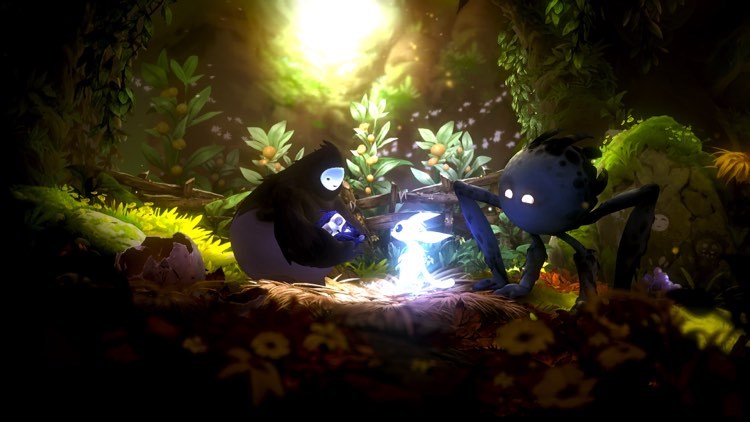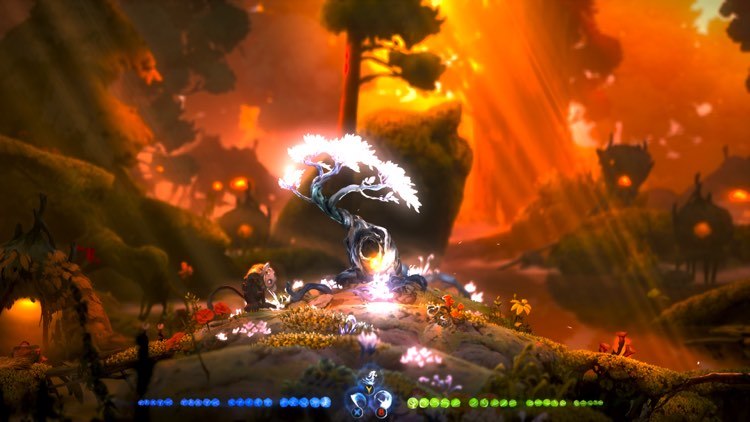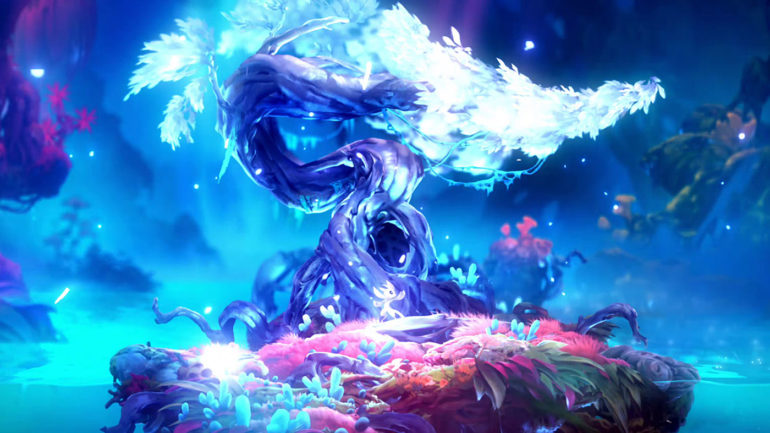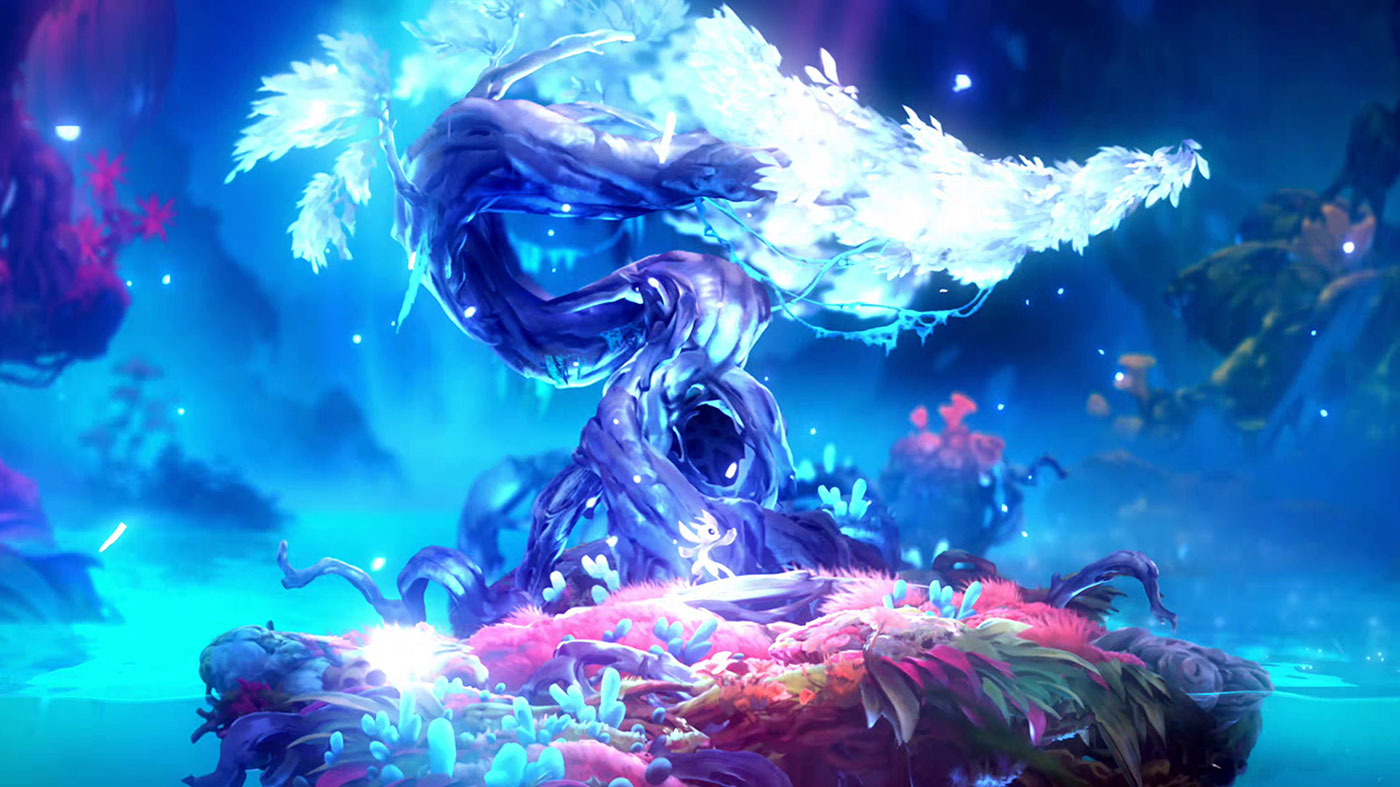The short-lived Ori franchise, comprised of Ori and the Blind Forest and Ori and the Will of the Wisps so far, has long been a stunner and I’d argue it’s still one of the most gorgeous looking series that the Xbox One generation delivered. Moon’s tender, Ghibli-like art direction coupled with Gareth Coker’s emotional, gently caressing score delivered one a whole game trip to heartache. This year’s sequel is one of the many games to receive Xbox Series X optimisation and out of all of the games I’ve played so far, I believe Ori and the Will of the Wisps is the big winner out Microsoft’s strategy of making the old seem anew.
The update offers two new display modes to choose from, each offering different performance experiences. Through 6K supersampling, the game manages to look even more stunning and sharp. If you’re unsure what that all means—like I was at first—it means that the game actually downscales the game’s 6K resolution to your TV’s 4K resolution, but still brings the newfound fidelity along for the ride. It’s incredible they were able to draw even more out of Will of the Wisps because it was so very beautiful to begin with.

The higher level of detail is a subtle difference for an untrained eye, but the supersampling achieved also reduces aliasing meaning the textures present far smoother and less jagged. The trade-offs that often accompany supersampling on PC like reduced performance or poorer colours, just don’t apply here because Ori is optimised to its teeth.
I feel as though it’s the other mode on offer where Ori sees the most benefit. As a 2.5D platformer that relies on input, performance, and smooth animation, Will of the Wisps is at its absolute striking best when running at 4K in 120 frames per second. The fact it gives up very little in terms of visual fidelity while doubling its frames, offering a more responsive and fluid experience, makes for a stellar upgrade indeed.

On the Xbox One X, late-game save files for Ori would tend to boot in at around ten seconds which, granted, isn’t even that bad in retrospect. Despite this, Series X still bests those times significantly, bringing it down to only about five seconds. It’s an undoubted improvement across the board, as the game’s now far more optimised than it was at launch.
If you’ve managed to avoid Ori and the Will of the Wisps up until this point, I absolutely implore you to take a chance on one of the year’s most beautiful platforming games. Now even prettier and more stable, it’s sure to light a fire in your heart.
THIS GAME WAS TESTED ON AN XBOX SERIES X FOR THE PURPOSE OF THIS REVIEW. A DIGITAL REVIEW CODE WAS PROVIDED BY THE PUBLISHER.
Original Review
Good things come to those who wait, and we have been patient for five years waiting for a follow-up to Ori and the Blind Forest. Developer Moon Studios aren’t messing around, having taken the concepts and ideas that made the original such a runaway success and magnifying them to craft an enormous, bold sequel to the once small team’s wholesome, winsome dream. It was a game sent out into the world with little more than hope that it’d resonate with and impact people in a beautiful and profound way, and the whole world over caught feelings for Ori. Now hope springs eternal for the little team that could, now four times the size, who have made it an impossible task questioning their triple-A credentials.
Having restored the withered, eponymous forest of the original game, the guardian spirit’s attention turns elsewhere, to another perilous fantasy land, in Ori and the Will of the Wisps. This sequel picks up where The Blind Forest left off as Ori, Gumo and Naru nurturing and raising Ku, the baby owlet left behind by Kuro, the first game’s antagonist and the eventual hero who sacrificed herself to restore the Spirit Tree and save her unborn hatchling. Blown adrift by a storm, Ori and Ku become stranded and separated on Niwen, a neighbouring island of Nibel and it’s up to Ori to bring light back to the decaying fantastical land and find his lost friend. The story is beautiful and even though Will of the Wisps presents a bleak world where the coexistence of life and death creates an arm wrestle that quickly sways in favour of the latter, there’s plenty of heart. Beneath the gloom, Ori’s ethos is hope and Will of the Wisps hammers home that ideal, meeting every adverse twist in the tale with optimism and belief.

There’s a genuine wealth of morals and sentiment that bear the weight of the Ori experience. Perseverance and will drive the central arc, though it’s the obstacles that challenge those close to Ori that serve as a lesson by a developer with a focus on inclusion and diversity. Ku’s hobbled wing might have seen her cast out by her kin, Ori and her adoptive family love her just as she is. The game’s antagonist, Shriek exists as the antithesis to Ku, a crooked owl cruelled by a similar lot in life, corrupted by the dark and without the support network. It’s not a subtle juxtaposition, though the consequences of eschewing those who need help are at the forefront of Will of the Wisps.
Much like the original, Will of the Wisps places a heavy emphasis on exploration and adventure. The sequel’s changes are profound and all go toward fleshing out Ori’s little world along with the intelligent creatures that dwell within it. Gone forever is Soul Link, the save-anywhere system from The Blind Forest which has been replaced with a more straight-forward autosave feature that won’t drain your energy reserve and leave you compromised in combat. Also banished from Ori is the ability tree, which has been replaced by collectible shards which can be equipped as passive buffs. And with a more populated world, Ori doesn’t have to be as self-reliant when it comes to upgrading abilities and sourcing map stones. With storefronts every you go, Ori’s light points act more like a currency rather than points to be funneled into skills. It’s more rounded and gives a greater structure to the game’s mechanics.

Even in the absence of Sein, Ori remains combat-ready courtesy of the game’s entirely overhauled mechanics placing a new focus on sword-based melee, though Ori also has bows and spears at their disposal once unlocked. Though only three of Ori’s abilities can be hot-keyed at once, being able to tinker with combinations to vary your approach keeps combat from growing stale throughout the game’s runtime. Of course, movement is an artform in Ori and great care has been taken by the developers to ensure synergy between how the map, several times larger than The Blind Forest’s, was designed and Ori’s abilities to scurry through it.
If you’re sticking to the main arc that sees Ori through to their destiny then the game is bound to last ten or so hours. Setting off to explore the farthest reaches of Niwen in search of trinkets, side quests, shrines and time trials is going to clearly pad that figure. There’s far more on offer here than we experienced in Nibel, and it’s clear a focus of Moon’s has been to make the sequel a more robust and in-depth version of the predecessor.

One issue I had with the initial release of The Blind Forest was that once it was over, that was it. This time around, players are granted an endgame state where things missed throughout the journey can be mopped up, which is made even easier courtesy of the fast travel mechanic that returns after its introduction in The Blind Forest’s definitive edition.
In The Blind Forest, Ori spent a lot of time narrowly escaping malevolent entities in tense, magnificently crafted ‘cat and mouse’ scenes. Though these are still part of the Ori experience, Will of the Wisps introduces full boss encounters demanding strategies that go beyond fleeing the scene. Quite often, these cinematic wars of attrition are bookends to a chase sequence that occurs in the middle of the encounter to mask a change in phase. It’s all incredibly seamless and adds another vivid layer to an already cinematic experience. Just as the original had a breathtaking hand-drawn aesthetic, inspired by Studio Ghibli’s line of beautiful films, Will of the Wisps is another technical marvel that resembles poetry in motion. Though a day one patch is in the works, our build of the game did see the facade crack at certain points of the game, but that’s bound to happen under the weight of ambition to build a bigger and better sequel. Fortunately, the issues I experienced were isolated to particular areas and are known so there aren’t fundamental issues, so to speak.

In a series so clearly inspired by the works of Hayao Miyazaki, it’s amazing that Moon continues to absolutely nail the most important aspect of the presentation — the music. Gareth Coker is a name on the rise in the world of videogame composition. His score adapts to the player input so subtly it’s easy to miss the shifts in tempo, but it’s his work during the game’s many tender moments that stay with you. Keep a box of Kleenex handy, Coker’s accompaniment will take the game’s bittersweet final act from tear-teasing to Grave of the Fireflies levels of lamentation.
A team of twenty created something magical with Ori and the Blind Forest and it’s fair to say that Will of the Wisps, a labour of love for what is now a team of eighty, is everything it was and more. Yet another wonderful adventure, fraught with danger and lessons to be learned, plus a world now bustling with things to do and faces to see, Ori and the Will of the Wisps is a tremendous sequel that is several times the challenge and spectacle of the original. Whichever direction Moon decides to take the series from here, let’s hope we’re not waiting five years for the next instalment.




